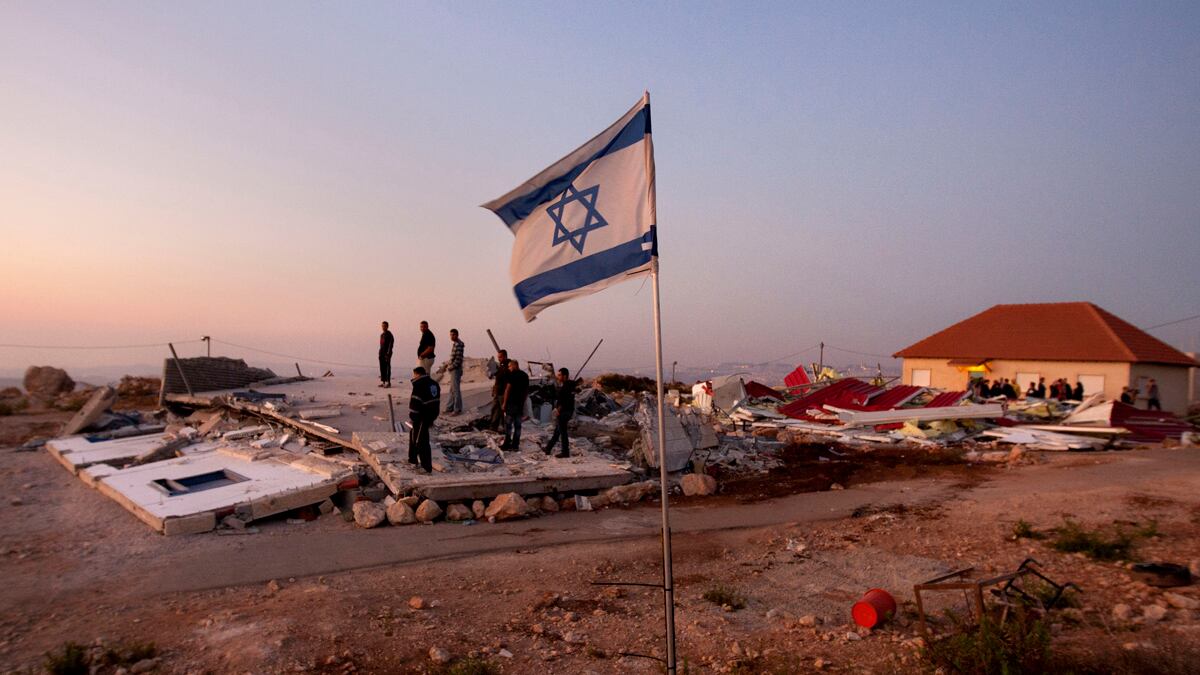On the eve of the Palestinian request for U.N membership as an independent state, Israel's government is still fighting an apparently doomed diplomatic battle against the move. The official argument is that Palestinian President Mahmoud Abbas has turned to the United Nations because he wants to evade making peace with Israel.
As Israeli Education Minister Gideon Sa'ar phrased it at a recent political rally, shouting into the microphone, "The Palestinians have been serial rejectionists of peace—ever since the U.N. decision of 1947."
Yet the minister's comment was loaded with unintended ironies. Put in context, the history cited by Sa'ar supports the opposite conclusion: Israel, and its allies in Washington, should support Palestinian statehood—not just as a step toward peace, but as a means of reestablishing the state of Israel after years of internal dissolution.
In his speech, Sa'ar of course was referring to U.N. General Assembly Resolution 181. Approved in November 1947, it called for dividing Palestine, then under British rule, into a Jewish and an Arab state. The land between the Mediterranean and the Jordan River was the arena of a classic ethnic conflict between two national movements, Jewish and Arab, each struggling for control over the entire territory. The U.N. proposed partition: Each national group would get part of the land and less than its dreams. The mainstream Jewish leadership accepted the U.N. plan and, based on it, proclaimed Israel's independence in May 1948.
Arab leaders in Palestine and the neighboring countries indeed rejected partition, and a brutal war ended only with armistice agreements in 1949. The armistice lines—Israel's pre-1967 borders—were only de facto, not de jure, boundaries. Still, they provided a vital element of a modern state: a clearly delineated territory in which the government exercises its authority.

Within those borders, Israel's leaders also created a democracy—albeit flawed, but more successful than in any other post-colonial state. It never suffered a coup d'état or a civilian dictatorship. Members of the Arab minority were citizens with the right to vote, and politicians' desire to attract their support eventually forced the government to dismantle the harshest form of discrimination against them: military rule of Arab towns and villages. The Israeli judiciary upheld the rule of law against executive whim, as in the landmark 1953 Supreme Court ruling that established that the government could not shut newspapers for expressing views it didn't like.
But the Six-Day War of June 1967 changed Israel's direction. Military victory assured Israel's survival. But its conquests—especially of the West Bank and Gaza Strip—set off a political process of undoing previous accomplishments, of dismantling the state and its democracy, one little-noticed step after another.
By that autumn, a cabinet member's administrative order erased the pre-war boundaries from Israel's maps. Official cartography again showed a single territory, from the sea to the river. In that territory two nationalities, Jews and Palestinians, again struggled for control, though this time Jews had state power on their side.
The change in the countryside began even before the redrawing of maps. In September 1967, the cabinet approved the first Israeli settlement in the West Bank—ignoring the foreign ministry legal counsel's evaluation that settling Israeli citizens in occupied territory violated international law. So blurring the borders also eroded the rule of law. The pattern has only become more flagrant since the 1990s, with government agencies supporting the rogue operation of building scores of small settlements, known as outposts, in violation of the laws in force in the West Bank.
Incrementally, legislation and military orders have insured that settlers enjoy all the rights of Israeli citizens as if they lived inside Israel. Most basically, Israelis living in the West Bank vote in Israeli elections; Palestinians in the same territory cannot. The democratic principles of equality and government by the governed have unraveled.
Nor can the unmarked border with the West Bank keep the decay from infiltrating Israel itself. Under Netanyahu, a flurry of anti-democratic bills has been introduced in parliament. One new law is aimed at circumventing court decisions that blocked a form of housing discrimination against Arab citizens. Another, eroding the right of free speech, bans any call for consumer boycotts of goods produced in settlements. The longer Israel holds the West Bank, the less is left of what Israel once was.
Now Abbas is asking the U.N. to recognize a Palestinian state in the West Bank and Gaza. Put differently, the Palestinian leader wants to affirm partition, to divide the land between the river and the sea into two states—with the 1949 armistice lines as de jure international borders. Yet in Sa'ar's strange logic, seeking partition today is as bad as rejecting it 64 years ago.
The opposite is true: Dividing the contested and bloodied land is still a prerequisite for peace. With Israeli and American input rather than opposition, a U.N. resolution could serve as the basis for renewed and effective negotiations. But Palestinian statehood is not just an opening toward peace. It also a means to rebuild Israel and restore its democracy.






